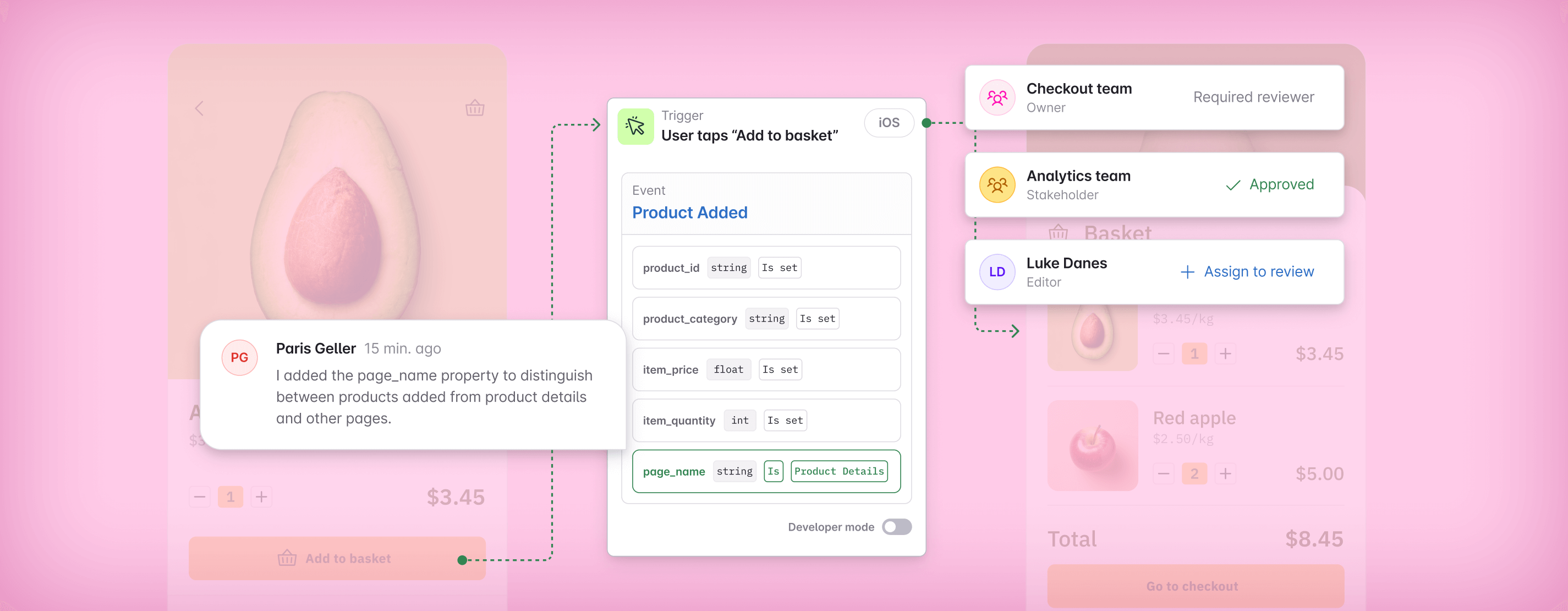In this article

What we shipped in launch week for data quality at scale
Everything we announced during our Launch Week as we march towards our vision: data mesh principles for event data governance.
If you’ve been following our Launch Week updates you’ll notice we announced a host of new Avo offerings over the last few days.
These updates are part of a clear vision for federated governance with domain ownership, that we narrated in our series, data mesh for event data quality we released leading up to launch week. This vision has not come from out of thin air, but from countless hours listening to and working closely with data teams, event data experts, product analytics leaders, and analysts at some of the world’s leading companies.
We’re incredibly proud to represent thousands of data practitioners who share our aspirations to …?—through their inspiring ideas and deep expertise, they’ve been as much part of the Avo journey as our employees.
Our shared vision is of a world where data mesh principles can be applied to event data governance (stay tuned next week for a summary of how our vision directly ties to these releases). Where delivering high quality data—at scale—is easy and fast, thanks to systemized governance and streamlined processes. And data teams work in perfect step with developers, domain owners, and data consumers—spending their time on the stuff that really matters, not the drudgery of review processes and back-and-forth communication.
So here’s to a big step towards this vision. We invite you to dive into the below releases, which mark major progress in our mission towards inspiring better data cultures.
We’ve made big strides this week. Here’s what we shipped.
1. Guardrails: Codify standards for data design so anyone can create consistent data, fast
Read the full product announcement post: Guardrails ->

On Monday we launched Guardrails: a way to codify design standards and unlock great event data creation for anyone in the organization.
- Who it’s for: Data practitioners who care about about data standards but find it scary to trust people to follow them and are stuck in constant police mode
- What it is: Think of Event name Guardrails like Grammarly for event data design. Set up advanced data design conventions and let Avo automatically provide feedback while enforcing design standards.
- Why it matters: Guardrails frees up data practitioners from endless data design reviews so they can spend their time and expertise doing what matters: getting insights to the people who need them most.
Get the full story on Guardrails.
Try Guardrails for yourself, or book a demo to discover more.
2. Stakeholders: Divide and conquer your schema management
Read the full product announcement post: Stakeholders ->

On Tuesday, we released Stakeholders—a way to segment your Avo tracking plan by areas of ownership and accountability, by connecting subsets of the events of the tracking plan with the users or groups of users that work with those events.

- Who it’s for: Data teams who want to empower domain experts to take ownership of their event data.
- What it is: A new way to set up dedicated areas of your schema so domain owners can take the lead on the data that matters to them. You’ll have Stakeholder-specific alerts and views, Impacted stakeholders to understand how changes impact others, and Required reviews that are specific to impacted stakeholders.
- Why it matters: Delegating ownership to domain experts is a prerequisite for scaling data.. It’s the only way to let people closest to a particular product area create great, relevant data. It also removes bottlenecks and reduces the need for manual review cycles from the data team.
Stakeholders empower each domain team to take charge of their data, by giving them a clear overview of the events they are leveraging.
Want Stakeholders added to your workspace? Request Stakeholders beta access ->
New to Avo and want to learn more? Book a demo ->
3. Domain-specific schemas for data quality at scale
Read the full product announcement post: Domain-specific schemas ->

Wednesday saw the arrival of domain-specific schemas, so domain teams can add their nuances to company-wide structures without disrupting the central source of truth.
With this in mind, we launched Event Variants and event specific property constraints. These are solutions designed to let people build granular, precise tracking changes to suit specific scenarios, without bloating the tracking plan or unknowingly breaking existing events.
- Who it’s for: Stakeholders who need to make iterations on events that are owned or used by other stakeholders, without causing disruption or duplicating events.
- What it is: some text
- Event Variants enable domain teams to make a version of base events with their spin on it.
- Event-specific property constraints allow you to tweak any property on your domain-specific events without needing buy-in from everyone using that property on other events.
- Why it matters: These solutions prevent data teams from running into the trap of either blowing up their schema with unnecessary changes to suit domain-specific use cases; or a wave of duplicate events every time a new team needs to iterate on their event data.
Want to try domain-specific data design in your workspace? Learn about Event Variants -> and event-specific property constraints ->
New to Avo and want to learn more? Book a demo ->
4. Federated event data governance for multi-subsidiary enterprises
Read the full product announcement post: Federated governance for multi-subsidiary enterprises ->

Yesterday we introduced Organizations and Centralized schemas—two powerful updates that enable federated event data governance for multi-subsidiary and multi-platform organizations. This allows central teams to to work with multiple independent schema registries within Avo.
- Who it’s for: Data teams who need to manage data across independent subsidiaries who have run their own analytics for years.
- What it is: some text
- An Organization is a collection of independent schema registries (typically associated with the org’s subsidiaries).
- Centralized schemas let you plan, review, and push out centralized data structures to subsidiary schema registries so you can roll out consistent event data across the organization.
- Why it matters: In large organizations with independent subsidiaries, central governance in a single schema registry just isn’t feasible. Nor is it possible to stay on top of multiple, siloed schema registries. These updates make it not only feasible, but fast for multi-subsidiary enterprises to govern and enforce great event data across the organization.

Want to establish central governance with Organizations and Centralized Schemas? Book a demo today ->
Help us shape what’s next: Launch week was great. But it’s just the beginning
We can’t wait to hear about the positive impact these new Avo offerings have for your event data quality. But the truth is we’re just getting started.
We’re incredibly focused to deliver on our vision for data mesh principles—both in terms of solutions to realize federated event data governance at scale, and to put data ownership in the hands of domain experts. We’ve made big strides this week, but the coming weeks and months will see us iterating and expanding on these exciting developments. But above all, we’ll be listening intently to you—our customers and community—and putting your wishes into reality.
So here’s where you come in. More than ever, we need your thoughts, ideas, and candid feedback to help us shape out this vision for better data quality. Join us for the next chapter, stay tuned for updates from us, and once again, thanks for being such a huge part of the Avo journey!
Subscribe to follow our progress on delivering data mesh principles for event data governance.
Block Quote



